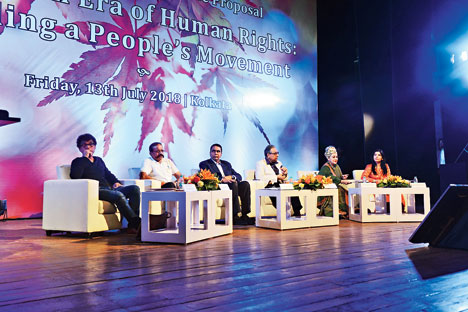
Science City:
For 36 years, a Japanese man has been writing and sending a peace proposal to the United Nations. Even at 90, Daisaku Ikeda stays committed to his life-long effort to steer the world away from conflicts and build a humanistic society. He has managed to spread his belief across 192 countries, including India, through the Buddhist society of Soka Gakkai that he leads.
The Soka education system, rooted in the society’s values, encompasses kindergartens in six countries, elementary to graduate level schools in Japan and a liberal arts university in California. Born to a family of seaweed farmers, the Buddhist philosopher and peacemaker has also founded an art museum, a music concert association and institutes for peace and policy research in Japan and the US.
The organisation’s India arm Bharat SokaGakkai held a conference on Ikeda’s 36th peace proposal at Science City on Saturday. “Soka means value creation. There is a lot of synergy between our values and the UN’s agenda,” said Vishesh Gupta, the chairperson of Bharat Soka Gakkai.
The guests were welcomed by volunteers clapping in rhythmic unison.
“Art can’t teach anyone anything. It only makes the human soul receptive to the good. Neither does artistic vision fall from the sky. It is the result of practice,” said filmmaker Suman Mukhopadhyay. He went on to talk of the issues he has addressed through his work on the stage and in films. He is planning a film on Kashmir, titled Paradise in Flames.
Dancer Alokananda Roy shared her experience of working with prisoners. “When I walked into a prison, I did not expect to meet people with heart. But if you treat them as human, they also feel human. I have worked with juvenile offenders, too, who are traumatised by society’s finger-pointing.They made a mistake. It’s fair to give them a second chance,” she argued. Her new students, however, have not made any mistake. They are transgenders. “They do not deserve to be cast aside.”
B.N. Ramesh, additional director general and inspector general of police, West Bengal Human Rights Commission, spoke of his experience of tackling insurgency-hit states across the country and people he met along the way, like an 11-year-old stone pelter in Kashmir.
Former Prasar Bharati CEO Jawhar Sircar shared his experience of attending three Unesco conventions. On the agenda was restitution of cultural property, i.e. the question of returning cultural artefacts plundered from another nation. “Management of peace at the kitchen level calls for patience,” he said.
Using the acronym VUCA coined by the US army, which stands for volatility, uncertainty, complexity and ambiguity, he said: “That’s the world we face. Is peace worth discussing in such a world? But man’s capacity to destroy is equalled only by his capacity to save.”
He cited the genesis of a cross-cultural signal – the salutation. “When strangers met in the medieval times, it was customary to delink the right hand from the body to indicate that no weapon would be used. Warriors would also raise their visors to reveal their identity. The gesture was stylised over time.”
Sircar also mentioned the phenomenon of Mexican wave in sports stadiums. “It proves that there is dormant in man a capacity to act in unison, rising above identity and ideology thrust upon him,” he said.
source: http://www.telegraphindia.com / The Telegraph,Calcutta,India / Home> Calcutta / by Sudeshna Banerjee / July 16th, 2018